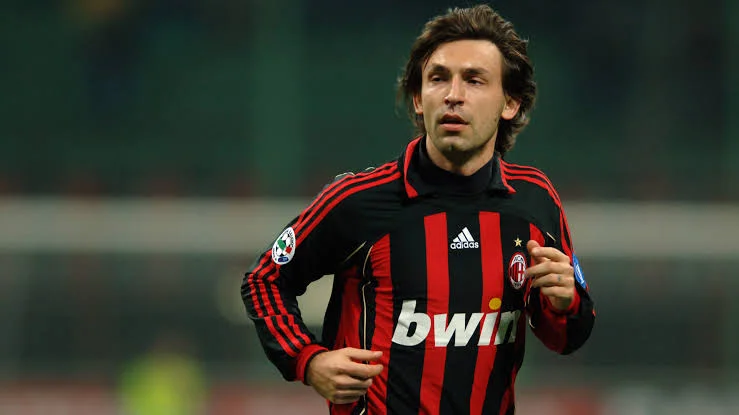A national icon in Italy and a World Champion, Pirlo is undoubtedly one of the greatest; discover his story here
Menu
A national icon in Italy and a World Champion, Pirlo is undoubtedly one of the greatest; discover his story here

Andrea Pirlo is one of those rare players who transcended the game—not for his physical strength or speed but for his intelligence, vision, and technical ability. Born in Flero, a small town in the province of Brescia, on May 19, 1979, Pirlo grew up in an environment where football was more than just a passion; it was a form of art. From a young age, he showed that he was destined for greatness, not only because of his natural talent but because of how he viewed football—with calmness, precision, and an unusual composure.
Pirlo began his career in the youth ranks of Brescia, where he quickly stood out as a unique midfielder. His ability to control the tempo of the game and deliver precise passes, even under pressure, caught the attention of Italy’s top clubs. In 1995, at the age of 16, he made his Serie A debut for Brescia, and it was immediately clear that he was a rare gem in midfield.
His first big move came in 1998 when he was signed by Inter Milan. However, his time with the Nerazzurri was marked by ups and downs, and Pirlo never quite established himself in the team. He was loaned to Reggina and later returned to Brescia, where he played alongside Roberto Baggio, who would become a significant influence on his career. But it was at AC Milan, where he arrived in 2001, that Pirlo truly found his home and where his legend began to take shape.
At Milan, under the guidance of Carlo Ancelotti, Pirlo was repositioned as a “regista,” a deep-lying playmaker who plays in front of the defense and dictates the game’s tempo. This change was crucial not only for Pirlo’s career but for modern football as a whole. His vision and ability to distribute the ball with pinpoint accuracy made him the maestro of the team. With him orchestrating the midfield, Milan won two UEFA Champions League titles, in 2003 and 2007, as well as two Serie A titles.
Pirlo was the type of player who made everything look easy. He had the ability to turn the complex into something simple, with passes that could dismantle entire defenses, long balls that landed precisely where he intended, and free-kicks that seemed like gentle kisses placed lovingly in the opponent’s net. But more than that, Pirlo played with an impressive serenity. On the pitch, he seemed to glide, unaffected by pressure or the frantic pace of the game. For him, football was a dance, and he always knew the next step.
After a glorious decade at Milan, Pirlo did what many would consider unthinkable: he moved to Juventus in 2011. At Juve, far from being in the twilight of his career, Pirlo found new life. Under Antonio Conte, he became the central piece of a team that dominated Italian football, winning four consecutive Serie A titles. His impact was immediate and long-lasting, and the “Old Lady” returned to being a dominant force in Europe, reaching the Champions League final in 2015.
Pirlo was also instrumental for the Italian national team, with whom he won the 2006 World Cup. In that tournament, he was the brain of the team, orchestrating every move with incredible precision. His performance in the final against France, where he assisted Marco Materazzi’s goal and calmly converted his penalty in the decisive shootout, was a testament to his class and nerves of steel.
Off the pitch, Pirlo was always an enigmatic figure. Discreet, almost shy, he never sought the limelight. His passion for wine, reflected in his vineyard in Italy, and his taste for the finer things in life showed a man who appreciated simplicity but with quality. He wrote a memoir titled “I Think Therefore I Play,” where he shared his reflections on football and life, always with that touch of irony and intelligence that characterized him.

Andrea Pirlo retired in 2017 after a stint with New York City FC in Major League Soccer. His departure left a void in football, not only because of the absence of his presence on the pitch but because of what he represented: a player who redefined what it meant to be a modern midfielder, someone who proved that even in an increasingly physical sport, intelligence, technique, and vision can still prevail.
Today, as a coach, Pirlo continues to influence football, trying to pass on the same philosophy that made him shine: that football should be played with both the mind and the heart, and that, in the end, simplicity is the ultimate sophistication.
Jornalista em formação pela Unesp Bauru.
The project emerged in June 2024, in São Paulo, envisioned by four sports enthusiasts. We believe that every game, every competition, every moment is a story waiting to be written.
For us, sports are much more than numbers and statistics; it’s about people, dreams, and overcoming challenges. It is one of the purest forms of human connection. It’s the moment when the soul speaks, shouts, celebrates, and cries. A universal language that connects people of all ages and cultures.
At The Sports Context, we aim to offer a complete experience. We want to be your go-to place for news and analysis, fueling your conversations with friends at the bar, always with the quality and dedication that only true sports lovers can provide. Our mission is to create a space where sports are celebrated, discussed, and, above all, lived.
Join us on this journey and feel your heart beat faster with each story told. Here, sports come to life in every word.
Created by Estratégia Digital